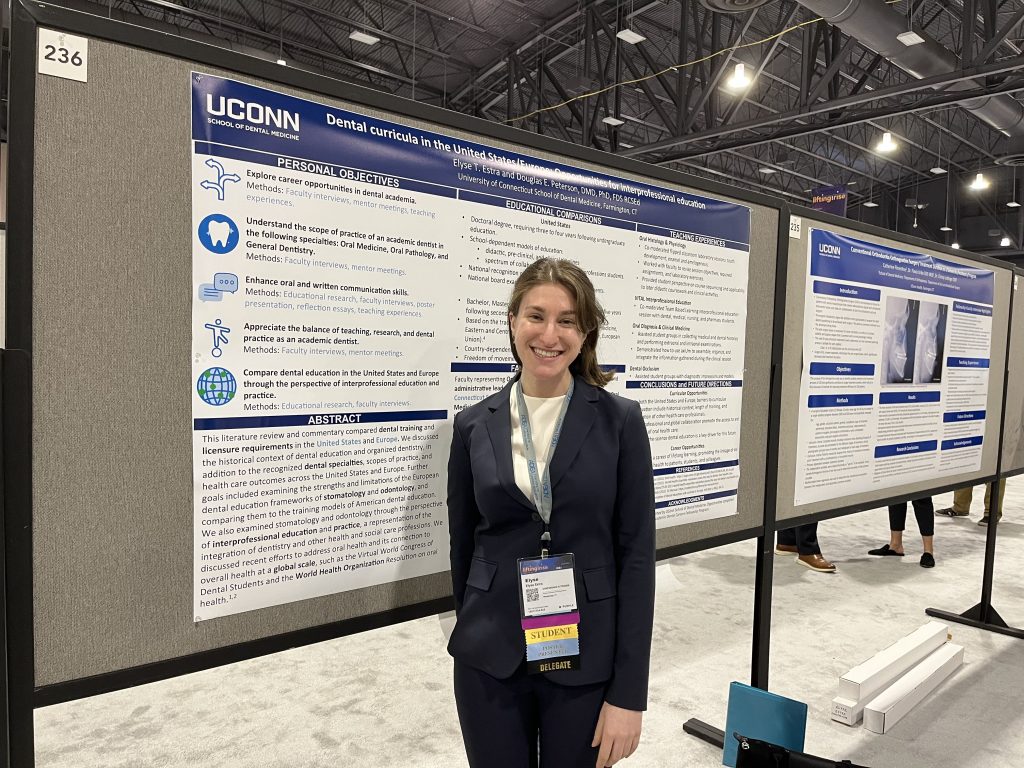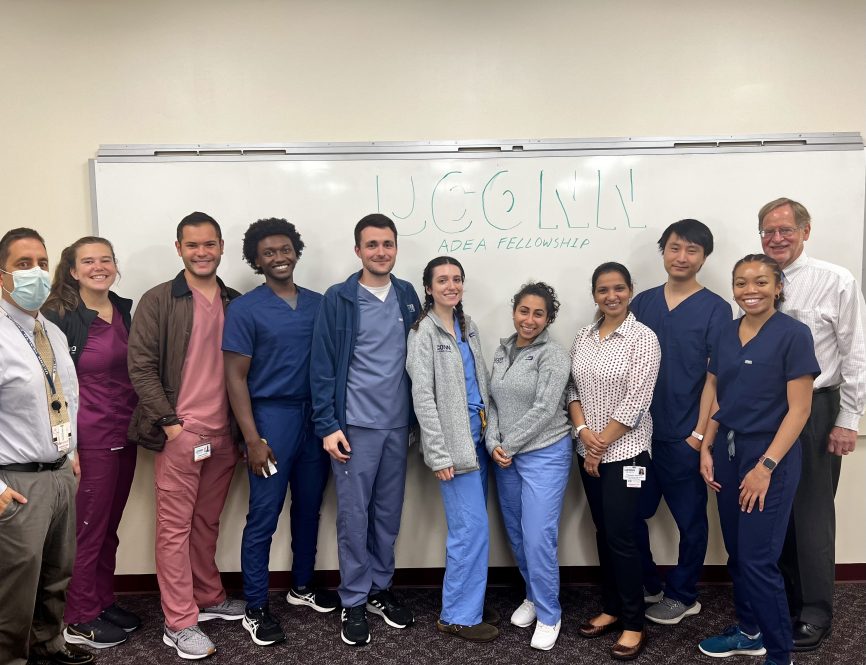The majority of dental students plan to enter a practice upon completion of their dental education. But efforts supported by the American Dental Education Association (ADEA), some students are inspiring some to take a different road.
ADEA, the sole national organization representing academic dentistry, is working to spark the interest of students at UConn and across the country to explore the path towards a career in academia. While academic dentistry is not part of the core dental curriculum, there are several elective experiences that UConn offers to students to provide a foray into academic dentistry. The UConn Chapter of ADEA also provides students with opportunities to learn about paths associated with a part- or full-time academic career in dental medicine.
Jacob Molgano, a third-year student, is president of the UConn ADEA chapter.
“As a member and president, I have been able to connect with my fellow classmates and faculty on a more in-depth and personal level,” says Molgano. “ADEA membership has provided me the opportunities to develop my leadership skills and to grow as a dental professional.”
Molgano has called his time as president a “rewarding experience.”
“As someone who is interested in pursuing an academic career in the future, joining ADEA was a no-brainer, its mission being focused around academia and the delivering of dental education.”
Other members of the executive board of the UConn chapter include vice president Mychael McKeever, a second-year student, secretary Logan Zhang, a third-year student, dental student ambassador program chair John Bruppacher, a third-year student, and literature review chair Tyler Deitelbaum, a second-year student.
“The UConn Chapter of ADEA is a stepping stone that gets people interested in the organization” says Dr. Eric Bernstein, associate dean for academic affairs. “Those who have a heightened level of interest tend to get engaged and may explore opportunities like the academic careers fellowship, or get involved in national leadership.”
Among other activities and programs, the chapter has hosted “Why I Teach” events with faculty and has implemented a dental student ambassador program to disseminate information about dental careers to high school students from historically underrepresented or marginalized groups.
One of those students who has been actively involved at the national level is fourth-year student Elyse Estra. Estra was elected as the national chair of the ADEA Council of Students, Residents, and Fellows (ADEA COSRF) at the 2022 annual meeting of ADEA. As one of seven ADEA councils, ADEA COSRF represents pre-doctoral, advanced dental education, and allied dental students—serving as the national voice for all students, residents, and fellows regarding the issues that shape the present and future of dental education.

“It’s been amazing,” Estra says about her position as national chair. “I will be the first to admit it’s a lot of work – with a lot of evening and weekend time, but I’m so incredibly grateful for the opportunity to work with COSRF, the Admin Boards of other ADEA Councils, and with ADEA staff. I’ve made some of my closest friends and contacts through ADEA. “
“Since beginning this new position, I’ve learned a lot about ADEA governance and the processes involved with dictating change. This is the biggest leadership position I have had, and I’m becoming more comfortable prioritizing and delegating tasks, and speaking to and leading larger groups and meetings.”
UConn faculty also hold positions within the national ADEA organization. Bernstein serves as the chair for the ADEA Council of Faculties. Dr. Steven Lepowsky, dean of the School of Dental Medicine, is a member of the ADEA Council of Deans. In addition, Dr. Douglas Peterson, professor emeritus in oral medicine, together with Bernstein, are the school’s liaisons to ADEA’s national Academic Dental Careers Fellowship Program (ADCFP). The ADCFP is a one-year elective experience in which interested students, in collaboration with faculty mentors, have opportunity to explore academic experiences in didactic and clinical teaching as well as research. In addition, the students can interview health professional faculty and administrators at UConn as well as nationally and internationally, depending upon student career interests, in order to gain additional insights regarding academic careers. There are a record-high nine UConn students participating in the ADCFP program this year.
“The opportunities provided to UConn dental students via ADEA represent exceptional experiences for them to explore their career passions in academic dental medicine,” says Peterson. “Faculty working with these students also value helping develop the next generation of academic leaders in the profession.”
The students work with Bernstein and Peterson, along with other faculty mentors, meeting regularly and engaging in activities aimed to explore careers in academia. Tyler James, a third-year student and immediate past president of the UConn chapter, is both a currently fellow and student coordinator of the fellowship program. James has found the faculty interviews that she conducted during her fellowship to be the most beneficial, calling each interview “incredibly insightful, inspiring, and unique.”
“As a woman of color hoping to pursue a career in academic dentistry, I wanted to interview women and/or individuals that belong to underrepresented racial/ethnic groups who are current or past dental faculty at all levels,” James says. “I had the pleasure of interviewing 11 women faculty members at seven different academic institutions either in person or online.”
“I learned that choosing a career in dental academia can provide a distinctive work-life-balance that contrasts private practice. Teaching allows educators to learn the latest developments in the field of dentistry, generate new knowledge through research, and still provide care for patients of their own.”
With ADEA helping inspire the next generation of academic dentists, students look forward to the future.
“After residency, I hope to hold a junior faculty position at a dental school,” says Estra. “I would love to see patients, teach, and do some educational or clinical research – if it’s possible to do it all! I think you have to be flexible in academics, and I’m very willing to do that. I hope to stay involved with ADEA too, either in the Council of Faculties or in some other way.”



